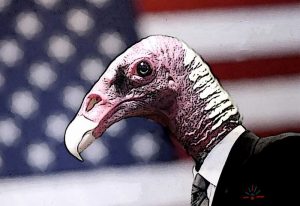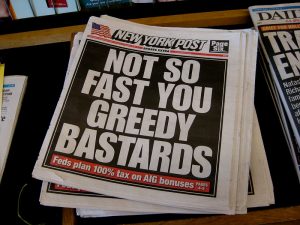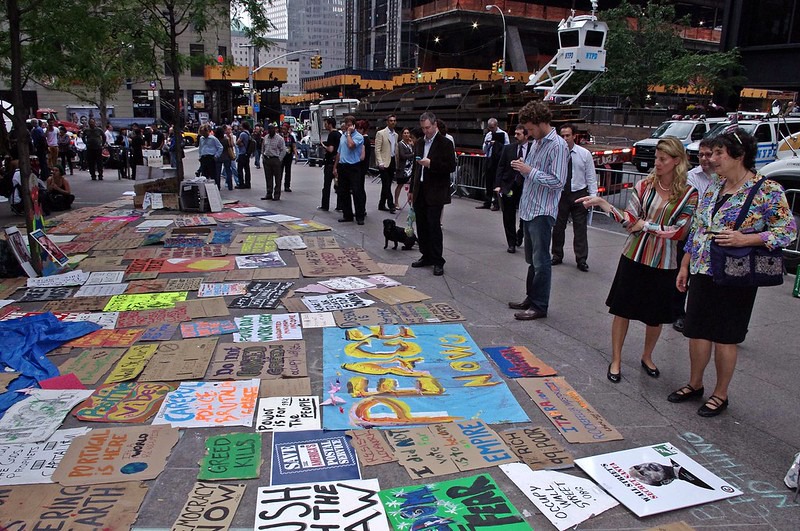In Bizet’s opera “Carmen,” there are several scenes with Carmen, Don José, and Escamillo in the town square, which was always full of people milling about talking about politics, the military (Don José was an officer), and society (Escamillo of course was a bullfighter). Does Carmen who worked at a cigarette factory make you think about the working and middle class people whose frustrations in this economy have been expressed by the Occupy Wall Street movement? Would Escamillo, the bullfighter, were he around today, be leading a march of the toreadors past Banco Santiago or JPMorgan Chase?
Now it seems like there is concern that Lisa Simeone, the host of National Public Radio’s opera show, attracted attention that NPR didn’t want through her role as a spokesperson for a group that many in the press saw as part-and-parcel of the Occupy Wall Street movement.
Actually, Simeone is a freelancer who hosts the “World of Opera” program that is produced by WDAV based in Davidson, North Carolina and distributed through the NPR network. She also hosts the NPR documentary program “Soundprint,” which is produced by the Soundprint Media Center. She attracted criticism for being identified as a spokesperson or steering committee member for the October 2011/Stop the Machine movement and that led to Soundprint’s firing her from the freelance position (following NPR standards) and NPR refusing to distribute the “World of Opera.” While it is hard to find evidence of Simeone’s steering-committee role on the October 2011/Stop the Machine website, she is on the website in a long list of “People Who Will Be There” and there is a well-done YouTube video of Simeone calling for people to join a scheduled October 2011 protest against U.S. military engagement in Iraq, Afghanistan, and elsewhere.
The reason? More or less, Simeone apparently violated NPR standards prohibiting involvement in politics. (Note: WDAV radio did not dismiss Simeone, saying it was only interested in the arts, not Simeone’s or anyone’s outside political involvement, so it has chosen to distribute “World” to stations on its own outside of the NPR network).
NPR’s stated policy, according to spokeswoman Dana Davis Rehm, is that “it’s a potential conflict of interest for any journalist or any individual who plays a public role on behalf of NPR to take an active part in a political movement or advocacy campaign…[because] (d)oing so has the potential to compromise our reputation as an organization that strives to be impartial and unbiased.” The specific language in the NPR ethics code is quite specific: “NPR journalists may not participate in marches and rallies” involving issues NPR covers.
Sign up for our free newsletters
Subscribe to NPQ's newsletters to have our top stories delivered directly to your inbox.
By signing up, you agree to our privacy policy and terms of use, and to receive messages from NPQ and our partners.
Simeone isn’t the only employee of a news organization to run into criticism connected with the Occupy Wall Street movement. Criticism has been leveled by conservatives against journalists Mike Taibbi and Dylan Ratigan for emails they sent to Occupy leaders helping them craft or modify their political messages for media and public consumption.
And while Simeone cracked a joke about NPR’s fear that she might insert a surreptitious political comment into a synopsis of “Madame Butterfly,” the issue is actually serious for journalists in this age of new media.
What should be the standard that applies to journalists (like Taibbi), pundits (like Ratigan), and part-time employees or even free-lance contractors working for news organizations, even if they have no official role in the news operation (as with Simeone)? We’re not sure about the answers, but some of the knotty questions affect Simeone’s NPR, Ratigan’s MSNBC, and us here at The Nonprofit Quarterly.
- Simeone wasn’t even an employee of NPR, much less an employee who worked in the news division. But NPR has an important news role to play. Does her October 2011 / Stop the Machine involvement create an image problem for NPR, regardless of her personal lack of involvement in the NPR news operation? Rehm says that NPR-identified employees—even if they aren’t really employees per se—represent the entire network and managers have to gauge the behavior of on-air talent with that lens.
- The NPR ethics standards prohibit news employees from partisan political engagement, but that doesn’t mean NPR employees, including news personnel, are blank slates without political opinions of their own.. Does Simeone’s publicly recorded but personal support of Occupy Wall Street cross the line into prohibited behavior for an NPR employee? Obviously NPR believes that it does.
- Matt Taibbi has been covering the Occupy movement for Rolling Stone and Dylan Ratigan has commented on the protests for MSNBC. Even though the initial source of the news that Taibbbi and Ratigan had advised Occupy Wall Street was the controversial “Big Journalism” website of Andrew Breitbart, it does seem pretty clear that both Taibbi and Ratigan exchanged emails with Occupy Wall Street leaders to help them draft and revise public statements, including one that an OWS leader was scheduled to discuss with NBC’s Brian Williams.
- Although Ratigan’s role in prepping a source to appear on a related network does raise questions, it is important to remember that he is mostly a pundit, not a news reporter. Should the Taibbi/Ratigan dynamic be of any more concern than MSNBC host Rev. Al Sharpton’s role in organizing the October 15 March for Jobs and Justice or Fox News’ host Sean Hannity, who trumpets his political engagement with Republicans and Tea Partyers? In these days of opinion journalism, with the line between opinionated reporter and opinionated talk show commentator blurry at best, does an engagement such as Simeone’s really cross the line?
- Simeone’s position is that her roles with “World” and “Soundprint” were about music and opera, not politics. But the Soundprint Media people describe Simeone’s work for them as journalism nonetheless. According to Moira Rankin, president of Soundprint, “In my mind, it’s fine if you want to be a leader of an organized protest movement, but you can’t also be in a journalistic role.” She said that Soundprint decided to adopt NPR’s ethical standards because “listeners don’t know the difference between NPR and independent producers across the country,” which is almost certainly correct. And yet, since politics had nothing to do with Simeone’s role on her radio shows, should it matter if an employee with no business relationship with political news engages in political activity on behalf of a certain cause or candidate?
- NPR encountered plenty of criticism for apparent missteps concerning the firing of NPR (and Fox News) commentator Juan Williams, as well as comments made by an NPR fundraiser who thought he was soliciting money from Middle Eastern contributors but who was actually dealing with a sting operation by conservative videographer James O’Keefe.
- At this moment, NPR is engaged in its fall pledge drive for listeners’ donations. It also counts on Congressional support, generally indirectly, for additional funding. Should that government funding, indirect as it is, make NPR a quasi-public/nonprofit news outlet, more sensitive to its employees’ or contractors’ political engagement (or political biases) as compared to outlets such as Rolling Stone or MSNBC, with their for-profit business models? Should news entities that depend on foundation or government grants avoid expressing opinions that discomfit major potential funders, and if that rule is broken, should the offender be fired?
There are probably no definitive answers, but here are our reactions to some of these concerns:
- Chasing Simeone out of the NPR orbit seems to be a gross overreaction by Soundprint. Her October 2011 /Stop the Machine extra-curricular activities had absolutely no impact on her NPR-distributed shows on music and opera. Unless she somehow were able to stick subliminal political messages into her introductions to the full-length operas broadcast on “World of Opera,” her political involvement should be considered a non-issue.
- Simeone wasn’t covering the Occupy Wall Street protests, but Taibbi and Ratigan were. This is a crucial distinction. Even if Ratigan is as much an entertainer as a journalist, if he’s reporting on an issue, he shouldn’t be simultaneously reporting and advising. The fact that the likes of Sean Hannity do that all the time for Fox News doesn’t make it right. In Ratigan’s case, his actions actually undermine his colleague Brian Williams by making Williams’ interview of the OWS spokesperson less credible.
- A nonprofit news network’s fundraising challenges should be completely irrelevant to this debate. If Simeone’s role really doesn’t conflict with the standards of NPR, especially since she was “covering” opera, not politics for the network, NPR shouldn’t have to account for Simeone’s personal political opinions. Donors who would make a funding decision based on Simeone’s YouTube video would probably in the end find other problems in network to complain about. Sending people with opinions into journalistic exile just because they have opinions is a strategy doomed to failure.













